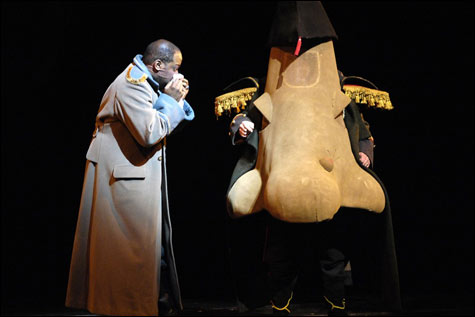
THE NOSE Shostakovich's satirical opera hit a vein in 1927 — and still does today.
|
By the time you read this, you've either seen or missed one of Boston's most exciting opera productions, Opera Boston's brilliant version of Shostakovich's The Nose — an opera written in 1927, when the composer was all of 22. The Nose anticipates by a year the satirical mayhem of Kurt Weill's Threepenny Opera, and it was inspired by (and almost parodies) another avant-garde masterwork, Alban Berg's satirical/tragic 1921 Wozzeck, also a 12-tone opera arranged in short, punchy scenes and centering on a single benighted character and beginning with someone being shaved and including a captain and a doctor among its dramatis personae. Shostakovich co-authored a libretto based on Gogol's satirically surrealistic short story of nearly a century before, and he composed a cheeky score that thumbed its virtual nose at Romantic opera and operatic convention.

Gogol's proto-Kafka story finds a pompous St. Petersburg bureaucrat, Kovalyov, waking up one morning to discover that his nose is gone. He runs into it on Nevsky Prospekt, where, dressed in the uniform of an even higher-ranking official, it treats its former owner with condescension and contempt before disappearing into the crowd. When Kovalyov tries to place a want ad, the editor turns him down but does offer him some snuff. ("It's good for hemorrhoids, too.") The police eventually locate the nose and return it, but Kovalyov's doctor refuses to sew it back on. In the end it reappears on our hero's face, and he returns to his self-important ways.
Shostakovich's score, composed directly for the orchestra (he bypassed, as always, the piano/vocal-score first stage), is electrifying. Light on strings and big on winds, brass, and percussion (10 percussion instruments! — and one lengthy interlude for percussion only), the music creates a rude, uninhibited cacophony of belches, farts, yawns, shrieks, and (of course) sneezes. But it's not ugly. It's like a lively, colorful, engaging soundtrack (the young Shostakovich worked as an accompanist for silent movies) that caroms between classical formality and contemporary pop, fugue and foxtrot. It's not dull for a second.
Certainly it was not dull given Opera Boston music director Gil Rose's exhilarating, idiomatic conducting and the extraordinary playing of the orchestra, whose line-up included a particularly dizzying xylophone and such unusual instruments as a balalaika and a flexatone. Rose also leads the Boston Modern Orchestra Project, so it's not surprising that Opera Boston's greatest successes — critical and popular — have been 20th-century operas.
The production was nothing to sneeze at either. It was staged by Julia Pevzner and designed by Alexander Lisiyansky, both Russian émigrés to Israel, and the 13 scene changes had a sophisticated cinematic fluidity that captured both Shostakovich's wit and his dark side. Wisely, they kept Gogol's time period. The first thing we saw, behind a scrim, was a large gold double-headed imperial eagle, which began to flap its wings like the phony turkey in the Marx Brothers' Room Service. When the curtain went up, we discovered dangling from its talons a large nose. Lisiyansky created a veritable ballet of moving horizontal and vertical scrims painted with black-and-white scenes of old St. Petersburg, among them its grimiest back streets, and Linda O'Brien's lighting captured the shimmer of water reflected from the Neva River and the ubiquitous canals. Most hilarious of Nancy Leary's aromatic costumes was the title character's grotesquely epauletted uniform and feathered, tasseled Napoleonic hat.
One of Pevzner's numerous inspired moments was her staging of the percussion interlude as Kovalyov's sexual nightmare, with a bevy of chorus girls wearing breastplates surrounding his bed and bumping and grinding to the pounding of the multiple drums. All the staging, down to the movement of the scenery, seemed a direct response to the music. Is that not the only kind of opera direction that has any real value?
The Nose has 70 solo roles, and these were filled by the outstanding principals and members of the chorus, singing in Russian. In his Twilight Zone noseless make-up, baritone Stephen Salters was in sterling, ringing voice, and he made Kovalyov's plight both funny and touching. As his nose, high tenor Torrance Blaisdell negotiated 11 high C's and a condescending nasal tone with skill and conviction. Hefty Bolshoi bass Vladimir Matorin was hilariously vulgar as the barber, who finds Kovalyov's nose in his breakfast roll and makes an unsuccessful attempt to ditch it. Tenor Frank Kelley, resorting to both megaphone and soprano register, was the intrepid police inspector who, bloodhound-like, gets down on all fours, his face against the stage, to sniff out the nose. Tenor Yeghishe Manucharyan did some of his best acting as Kovalyov's stupid lackey, Ivan. Sopranos Noune Karapetian (the barber's shrewish wife), Sol Kim Bentley (a sexy pretzel seller), and Yelena Dudochkin (Kovalyov's would-be fiancée), Armenian mezzo Victoria Avetisyan (the would-be fiancée's mother), baritone Anton Belov (the newspaper editor and doctor), tenor Matthew DiBattista (Kovalyov's friend, invented for the opera), and everyone in smaller roles brought all these characters to vivid life.